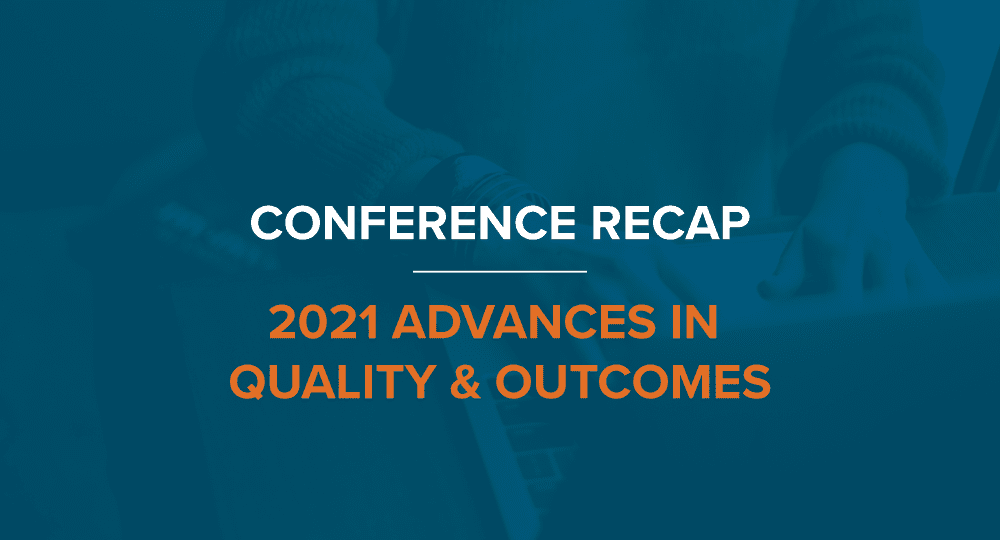The Annual Advances in Quality & Outcomes (AQO) Meeting was held October 12 – October 15, 2021. Surgeon Leaders, STS Staff, and Data Managers came together to share research and clinical findings with the goal of improving data collection and patient outcomes. Due to continued challenges presented by COVID – 19, the conference was once again held virtually.
Participants joined the conference using a virtual web platform. On-Demand and Live sessions were presented for all four components of the STS National Database with one day of the conference dedicated to each component of the database.
During the live sessions, participants were able to comment and ask questions that were answered by the experts after each presentation. Each day, a live session titled “What Data Managers Want to Know” was featured. This session included the top questions posed by Data Managers during the conference. A panel of STS physicians and staff answered these questions live. The panel also presented difficult case scenarios commonly submitted as FAQs and how to correctly code these difficult data elements.
Once again, posters were posted for review on the website. Poster participants recorded a presentation of their research for review as on-demand sessions. It was great to hear from the authors of the posters. This is a wonderful feature that we hope will continue once we return to live conferences.
The General Thoracic Surgery Database Session focused on Version 5.21 and provided education regarding coding of difficult elements for each case type in the new version. A few of these sessions are highlighted below.
- Dr. Kozower presented a very informative talk on how to code post-op complications. He explained that the purpose of this data point is to help quantify the severity of post-op complications and facilitate better risk adjustment modeling and quality composites.
- Dr. Seder presented an Esophageal Cancer case scenario. He explained the different methods for esophagectomy. He also reviewed the difference between clinical and pathological staging, and “walked the form” demonstrating the correct abstraction of difficult data points for this case type.
- Dr. Stephen Broderick and Marvin Borja reviewed a Lung Cancer case scenario. They reviewed the different types of lung resection, methods for clinical and pathological staging for lung cancer and gave examples of tools to assist with clinical staging. They also discussed the new Version 5.21 nodal assessment data elements.
- Dr. David Wormuth discussed both the reasons for modifying the DCF and future implications of coding the Lung CA Nodes Assessed section of version 5.21.
- On-Demand sessions were provided for Hiatal Hernia, Trachea, and Thymus case types as well as the GTSD Audit process. These sessions gave excellent reviews of the surgical techniques, and furnished tips for abstracting difficult elements for these case types.
The STS Adult Cardiac Database Session featured both live and on-demand sessions as well. Below are a few highlights.
- Dr. Bowdish and Dr. D’Agostino kicked off the day with a general update regarding the different working groups and their purpose within the STS. They also shared that there would be no update of this registry in 2022.
- Dr. Shahian and Dr. Desai gave an overview of the new 3-year composite measure and explained that moving to a 3-year timeframe would give a more accurate picture of how institutions are performing across the board. They emphasized how this new model allows for a greater number of institutions to obtain 3-STAR status.
- Dr. Kim and Nancy Honeycutt gave a very informative presentation on coding Aortic cases. They presented examples of operative notes and reviewed how to translate the many examples of a surgeon’s dictation onto the DCF correctly.
- Dr. Hui and Jennifer Cook reviewed MAZE procedures and provided a visual walk-through of the procedures explaining each lesion and how to complete the DCF for both left and right-sided MAZE lesions.
- Dr. Horvath spoke regarding Endocarditis and reviewed a case scenario to help Data Managers better understand how to code the procedures associated with this difficult case type.
- Dr. Hammon provided a very informative review of the Mitral Valve anatomy and the procedures associated with its repair or replacement.
Both the live and on-demand sessions will be available for conference attendees on the virtual platform for further review.
Once again, the planners, speakers, programmers, and exhibitors made this a conference to remember. Thank you to all who made this conference possible. We look forward to seeing everyone live in Rhode Island next year!





